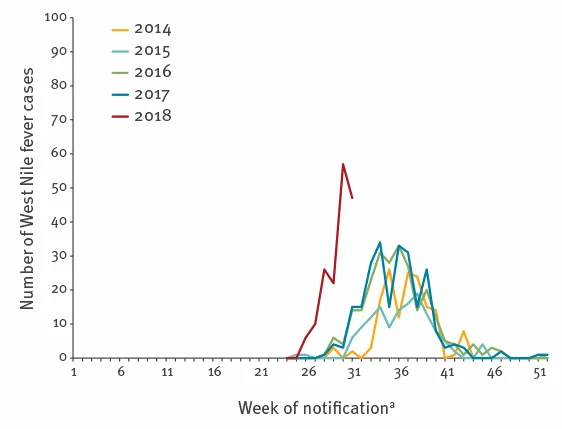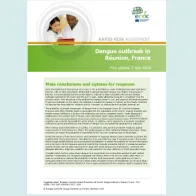Unusual early start of the West Nile fever season and rise in cases: ECDC assessment

In 2018, and as of 9 August 2018, the EU Member States reported 231 human cases and the EU neighbouring countries 104 cases. In the past week, 154 cases were reported in EU and the neighbouring countries.
The surveillance data gathered through seasonal monitoring indicate a higher number of West Nile virus infections compared to the same period in previous years. Moreover, these cases were reported earlier in the season.
A rapid communication published in Eurosurveillance evaluates the epidemiological situation comparing it to data from previous years.
- In 2016 and 2017, the first cases of the season were notified from week 28 onwards while in 2018, the first cases were reported in week 26.
- Between 2014 and 2017, five to 25 cases were notified from week 25 to week 31; in 2018, 168 cases were reported during the same time period.
This may indicate a high level of virus circulation in affected countries, which could potentially result in the occurrence of a high number of cases during the coming months, states ECDC risk assessment published today.
While the majority of areas affected in 2018 were areas where cases were reported in the previous years, it is likely that the virus spreads to new areas in 2018.
Residents in, and travellers to affected areas are at risk of being infected. The elderly and immunosuppressed people are especially at high risk of developing West Nile virus neuroinvasive disease (e.g. meningitis or encephalitis).
Options for response include:
- All persons in affected areas should take personal protective measures against mosquito bites;
- Clinicians and public health professionals in the affected and also in areas yet unaffected areas with suitable environmental conditions should be aware of the epidemiological situation to ensure early detection;
- Clinicians are advised to include West Nile fever in the differential diagnosis for persons who have returned from affected areas;
- EU Member States must implement 28-day donor deferral or test blood donors, after leaving an affected area, to prevent infection through blood transfusion.
Rapid risk assessment

This rapid risk assessment addresses the public health risk associated with the early occurrence of a large number of West Nile virus infections in the EU/EEA and EU neighbouring countries in 2018.
West Nile fever risk assessment early season 2018
English (642.25 KB - PDF)
